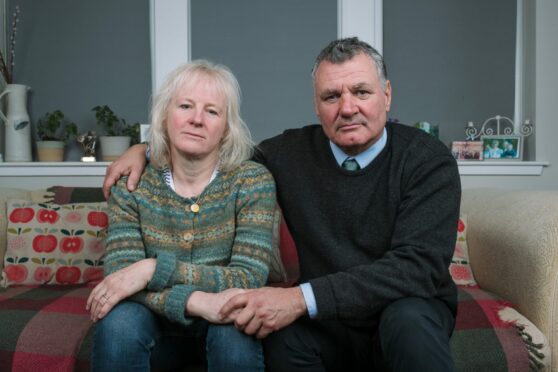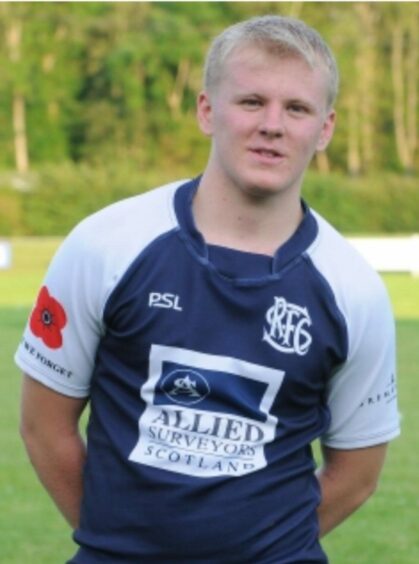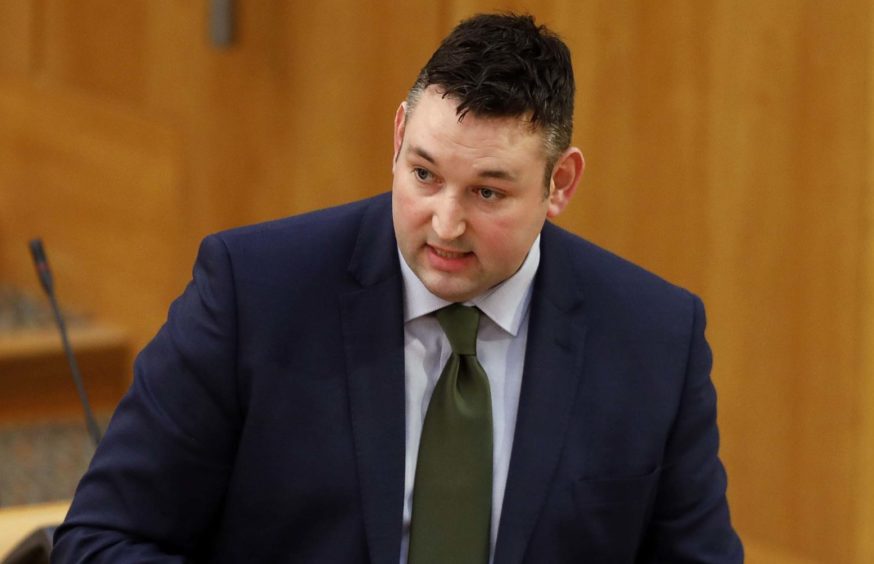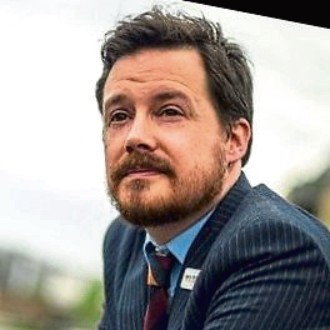
Parents of an autistic teenager who took his own life warn inadequacies in mental health care are putting more young lives at risk.
Talented musician and rugby player Harris Macdonnell, 19, climbed an electric pylon to his death in August 2020 after being placed in an adult psychiatric unit two-and-a-half years earlier.
His mother, Dr Jane Macdonnell, firmly believes Harris would still be here today if he had instead been placed in a specialist unit for young people and the family had received adequate support after he was diagnosed with autism.
The consultant paediatrician and her husband are calling for a Fatal Accident Inquiry into their son’s death. She said: “Harris was a highly intelligent, inquiring child who was so traumatised by being placed in an adult psychiatric unit, he lost all trust in those who were supposed to help him.
“There is no doubt in our minds that the critical lack of specialist care for young people in Scotland played a major role in what happened to Harris. That is why we believe it is very much in the public interest to hold a Fatal Accident Inquiry.
“Lessons must be learned if lives are to be saved in future. Only an inquiry will adequately highlight what needs to change.”
Experts say people with autism are nine times more likely to die from suicide, with six out of every 10 thinking of taking their own lives and more than a third actually attempting it.
Young people are particularly at risk, with just over 50 specialist beds across Scotland and long waiting lists for mental health appointments, and experts warn not enough is being done to recognise the danger.
Between 2011 and 2020, according to Scottish Government figures, 820 young people took their own lives, with figures expected to escalate further for the period over lockdown.
Harris’s father Dave, 59, an agricultural specialist, said: “We are not the only family who has been left living with tragedy because of the lack of facilities for young people suffering mental health issues. Things have to change, and one of the biggest things is ensuring young people don’t have to go to adult psychiatric units.”
Harris, who lived with his family in a village near Melrose, was clever and engaged at school. But changes began to emerge as he grew into his teenage years.
His mum, 54, said: “Harris was a delightful boy. He had an inquiring mind. He was always active. Because we have a large close-knit family, we didn’t immediately worry that he had no best friend or social group. He just seemed happy to be joining in with the rest of us.”
The family sent Harris to a private school, believing it would be better suited to his needs. Macdonnell said: “The reality was it was the worst thing we could have done because Harris began being bullied. He internalised it and bottled it up, which made him depressed.”
Harris was prescribed medication. But he began talking of self-harm and his worried family sought help. Due to the lack of beds for young people, NHS Borders admitted him to the Huntlyburn adult psychiatric unit in Melrose in February 2018 when he was just 16.
His mum said: “We believe if Harris had been sent to a young person’s unit rather than an adult ward, where he was terrified by the behaviour of everyone around him, he would not have been so traumatised. Instead of being in a young person’s unit where he could relate to others, Harris was placed in group therapy with adults with alcohol and drug issues which bore no relation to what our son was going through.
“Huntlyburn was completely unsuited to his needs. The place overwhelmed him and he spent all his time planning escape. He did not feel safe. The thought of ever being sent back there left him absolutely terrified. Even driving near the hospital would send Harris into a panic, fearing he was being returned to Huntlyburn. I don’t believe any of the team looking after Harris fully recognised how deeply traumatised he was by his experiences at that place.”
Dr Jess Sussman: We must reverse the freeze on mental health budgets – it is just not healthy
Harris was placed under close observation but still managed to abscond. On one occasion he was found walking along a country road. During the car journey to return him to hospital, he became so distressed at being taken back to the ward, he threw himself from the vehicle, sustaining facial and arm injuries so severe he needed extensive plastic surgery. Only then was Harris admitted to a young people’s unit in Edinburgh, where he was diagnosed with Autism Spectrum Disorder. His mum said: “Once the diagnosis was made, we were more or less just left to get on with it. There was no support for us to learn how Harris would attempt to mask his condition, making it more difficult for us to understand when things were escalating.”
After being discharged from the specialist young person’s unit, the Covid lockdown affected Harris’s mental health. Despite raising their concerns with the local community mental health team, the teenager’s family felt “red flags” that should have indicated Harris’s mental health problems were escalating – such as not engaging or speaking – were not acted upon.
His mum added: “We could see Harris’s behaviour changing. He was becoming withdrawn and distressed. We recognised the situation was becoming unsafe for Harris but, no matter what we said, our concerns were not acted upon. Leaving Harris at home – distressed, anxious and in despair – was neither ‘appropriate’ nor ‘best’ and we, as a family, have to live with the consequences for the rest of our lives. Had appropriate action been taken when it was most needed, a tragedy may have been averted.”
Dr Macdonnell said the community mental health team was “completely out of touch with the extent of Harris’s mental health problems”. She said that, despite the family repeatedly pointing out their concern, there was no discussion about taking immediate action, or even considering medication for reducing his anxiety, agitation or poor sleep.
Just two days before Harris took his own life on August 19, 2020, the family warned the mental health team again he was having a “meltdown” and medication to tackle his anxiety was needed. But a “team meeting” was not due to take place until the day Harris died. A review of how NHS Borders handled the case found no records on how to respond if the patient became distressed or overwhelmed. Documentation also failed to reflect the urgency of the intended clinical response. However, the review failed to find “any clinical failing”.
Harris’s mum said: “I’m concerned about these findings. There was a lack of risk assessment surrounding Harris’s stay in Huntlyburn, including a failure to document discussions of a ‘wish to die’ which were not adequately communicated to staff. There was also no written protocol over how staff can ensure the safety of a young person, or what to do if they attempt to abscond.
“Later, once Harris was placed under the care of the community mental health team, the dual lack of continuing risk assessment and communication between team members was also of grave concern to me.
“The last recorded evidence of a clinical risk assessment of Harris’s case was on June 22, 2020. His clinical presentation deteriorated in the weeks following this, yet there is no further recorded risk assessment despite us raising it with them. This is a very serious omission which, in my opinion, reflects poor clinical practice within the community mental health team and highlights genuine patient safety concerns.
“We have not even been given an apology for the loss of our son.
“I’ve had to retire from my role as a consultant paediatrician covering NHS Borders and NHS Fife due to issues resulting from Harris’s avoidable death. We cannot change what happened to Harris but it has moved us to campaign to ensure no vulnerable young person is ever again placed in an adult psychiatric unit.”
Harris’s dad added: “We miss our son terribly. Harris was such a cheery, sensitive soul, always chatting to people and looking out for others. Until his early teens, Harris enjoyed life and was great fun. He loved a laugh and was a great mimic. As well as being a talented sportsman and musician, he could quickly master card tricks, Rubik’s cubes and write amusing stories.
“This tragedy should never have happened. We hope a Fatal Accident Inquiry will provide the answers and highlight the changes needed so no other family has to suffer the loss that will never leave us.”
Meanwhile, figures show 190 vacancies within Child and Adolescent Mental Health Services while just 70% of young people are seen within the government’s own target time of 18 weeks. Dr Jane Morris, vice-chair at the Royal College of Psychiatrists in Scotland, said: “The Scottish Government must ensure that CAMHS receives the funding it needs to implement positive and long-term change.”
The Crown Office and Procurator Fiscal Service said: “The investigation into the death of Harris MacDonnell, under the direction of the Procurator Fiscal, is ongoing.
“We are committed to ensuring the facts and circumstances surrounding Harris’s death are investigated fully and thoroughly but appreciate the impact ongoing investigations can have on those affected. Significant progress is being made and we will continue to keep the family updated of developments.”
MSP: The number of young people taking their lives is shocking
Shadow Social Justice Secretary Miles Briggs is set to raise the issue of young people being placed in adult psychiatric units with the Scottish Government.
He said: “The tragic loss of Harris Macdonnell and the way he and his family have been repeatedly failed is exactly why I will be asking the government to bring an end to vulnerable young people being placed in adult psychiatric wards.
“It saddens me deeply to say that they are not the only family who has suffered in this way. The number of young people taking their own lives has reached such shocking levels, we must change what we are doing.
“That means a far greater investment in providing more dedicated mental health beds for young people across the whole of the country so they are more accessible to local communities, along with an increase in the provision of mental health teams who can provide care in a young person’s home 24/7 which can be less traumatic than placing them in a hospital environment.”
Ralph Roberts, chief executive of NHS Borders, said: “Following Harris’s tragic death we have undertaken an extensive and externally-led review of his care, so that we can learn any lessons to improve our services in the future. Actions identified by the review have now been implemented. We agree that children and young people who require inpatient care should, wherever possible, be admitted to an age-appropriate unit.
“If this is not possible, and they have to be admitted to our adult inpatient unit, we will always advise the Mental welfare commission (MWC) that this has happened. Our practice is then informed by the MWC for Scotland guidance on treating children and young people in adult mental health wards.”
The review of the case said: “NHS Borders are no different from other areas, in that services for these individuals are highly limited. The national conversation continues as to how services can be better positioned to meet needs.
“Within NHS Borders, though staff involved in this case had both training and experience in working with those with neurodevelopmental disorders, a theme identified within the review was that staff felt training for existing community mental health teams could be improved and is currently limited.”
OPINION: Young people want support in schools
By Nick Hobbs, Head of strategy for the Children and Young People’s Commissioner Scotland
All children have the right to the highest attainable standard of health, including mental health, and they must have access to services to support this.
Scotland was experiencing a mental health crisis before the Covid-19 pandemic, and it has only got worse.
A lack of timely access to support can seriously impact on children’s rights to health and development, and at its most severe, their right to life. Children should always be able to access care that is appropriate to their age, and they should not be sent to adult wards, which risks further trauma.
Children and young people have consistently told us that they need mental health support before they reach crisis point.
That means investing in community-based mental health services that are accessible to them. They have said they want more support in schools where they can feel comfortable in getting that help from trusted adults.
We must use resources in the best way and invest in mental health services to support children and young people before they are in a crisis.
Need help? Call the Samaritans on 116 123, free from any phone, 24 hours a day, 365 days a year, email jo@samaritans.org or visit samaritans.org

Enjoy the convenience of having The Sunday Post delivered as a digital ePaper straight to your smartphone, tablet or computer.
Subscribe for only £5.49 a month and enjoy all the benefits of the printed paper as a digital replica.
Subscribe
 © Andrew Cowan/Scottish Parliament
© Andrew Cowan/Scottish Parliament © SYSTEM
© SYSTEM